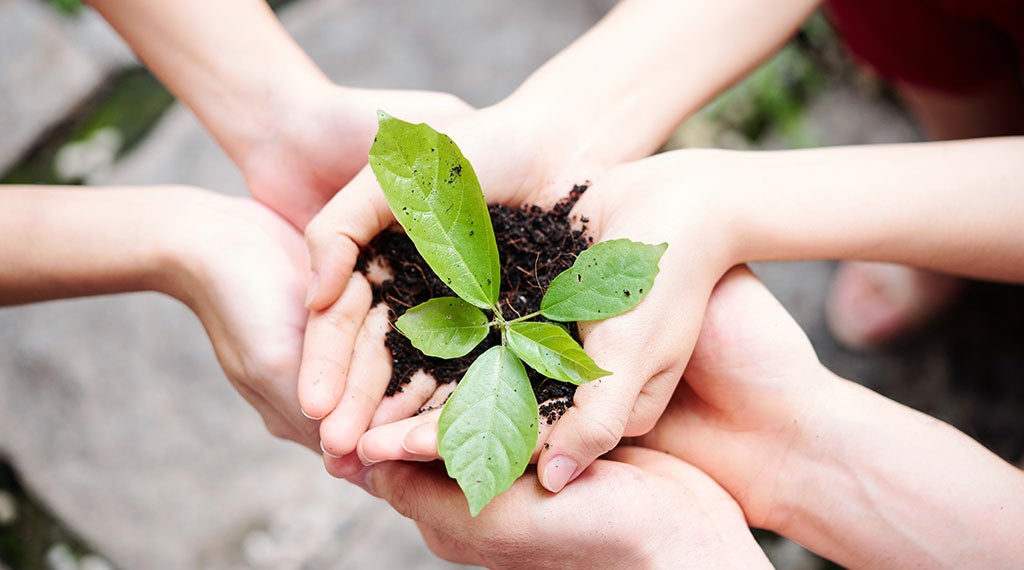By simply following eco-friendly gardening practices, you too can help conserve the environment. It’s easier than you think…
Our beautiful planet is severely endangered – pollution, soil degradation, water shortages, spreading deserts and an evergrowing list of endangered and extinct plant and animal species. But each and every one of us can do our bit to not only help preserve existing natural ecosystems but to create new, healthy environments for plant and animal life. Here’s how you can become an eco-conscious gardener, and a friend, rather than a foe, of planet Earth.
Reduce your lawn
The bigger your lawn, the more water it requires. A smaller lawn – or even none at all – will reduce the amount of time spent on garden maintenance. Plant water smart low-growing ground covers instead and intersperses with paving or gravel. Leave gaps filled with pebbles or gravel between paving stones so that rainwater can permeate the soil. It is necessary to level the particular area as well as lay down a weed-suppressing still rain-permeable membrane. And only then you can start spreading gravel or laying paving.
In new gardens, consider planting a low water usage lawn such as buffalo or week; let it go naturally dormant in winter, and save on water.
Plant for biodiversity
Create ecological balance in your garden by providing as wide a range of natural habitats as possible. Creating different types of natural environment – woodland, wild grassland, water garden – will not only make for an interesting garden but also increase the diversity of animal life in your garden. In city areas, your garden will become a small but vital sanctuary for the wildlife under pressure from urban expansion.
Mulch it up
In all natural environments, there is a layer of decomposing plant and animal matter littering the ground. Mulching mimics this natural occurrence and not only provides food and a home to all sorts of small animal and insect life but also provides nutrients and insulation for plant roots. Mulch shelters plant roots from frost and scorching sun and help retain moisture in the soil. All organic matter can be used as a mulch. This includes bark chips, pine needles, nut shells, peach pips, and half-rotted compost. If possible, don’t remove fallen leaves from beds as they serve the same purpose as a mulch.
Recycle
Recycling, including composting, divert organic waste from landfills, reducing methane emissions from landfill sites. Methane is a potent greenhouse gas 21 times more powerful than carbon dioxide. So, as far as possible, reduce the waste that comes out of your home and garden. All organic products (vegetable peelings, grass cuttings, paper, etc) can be turned into compost to feed your garden soil. Why not set up a ‘worm farm’ to produce highly nutritious fertilizer out of raw organic matter? See box for suppliers of worms and worm farms.
Plant water-wise
If you do wish to plant exotic plants, choose low water usage ones. It is best to plant those that originate in countries with hot climates similar to our climate. These plants do not require a lot of watering and are known as water-wise or water smart plants. Typically these plants – such as artemisia, cistus, gaura, lavender, rosemary, and echeveria – have leaves that are leathery, hairy or succulent. The leaves are often small, or silver-grey in color.
Conserve water
Avoid excessive watering. Only water if the soil is dry underneath the top layer. Gardeners often make the mistake of watering when they see the ground surface looking dry, but if the soil is damp underneath the surface, watering is unnecessary. Water the soil and root area of plants rather than their leaves.Harvest water by collecting rainwater run-off from the roof in water tanks, and using this water to irrigate the garden. If you install an automatic irrigation system, consider a drip irrigation system, or get the type that has a moisture meter to control the amount of water irrigated and set it to its lowest setting, rather than the type that is controlled with a clock timer.

